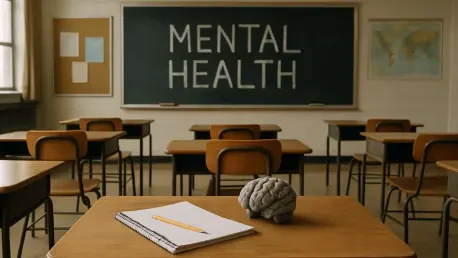In a world where the transition from primary to secondary school can be both exhilarating and overwhelming for young students, a groundbreaking initiative has emerged to address the mental health challenges that often accompany this pivotal life stage. Launched on World Mental Health Day, this digital campaign, spearheaded by Health Minister Mike Nesbitt and Education Minister Paul Givan, aims to empower secondary school students with accessible tools to navigate stress, build resilience, and foster emotional well-being. By harnessing the power of technology through a curated selection of free, age-appropriate self-help apps, the initiative targets a critical period when young people are particularly vulnerable to emotional struggles. This effort not only highlights the growing recognition of mental health as a priority in education but also showcases a forward-thinking approach to prevention and support, ensuring that students have resources at their fingertips to thrive during challenging times.
Harnessing Technology for Emotional Well-Being
The core of this initiative lies in its innovative use of digital tools to provide immediate and scalable mental health support for secondary school students. A specially curated library of apps, accessible through a dedicated health platform, offers resources on mindfulness, stress management, and self-esteem building, all tailored to the unique needs of young adolescents. These apps have undergone rigorous evaluation for digital safety, clinical accuracy, and user accessibility, ensuring that they meet high standards of reliability. By focusing on prevention, the campaign seeks to equip students with strategies to manage their emotions before issues escalate, addressing the often-daunting shift to a new academic and social environment. This digital approach reflects a broader trend of leveraging technology to bridge gaps in traditional mental health services, making support more readily available to a generation that is already deeply engaged with digital platforms.
Beyond the apps themselves, the campaign emphasizes flexibility and personalization in how these resources are utilized. Designed primarily for use at home outside of school hours, the tools allow students to seek help in a comfortable and private setting, which can be crucial for those hesitant to discuss their struggles openly. School nurses play a key role during Year 8 Health Appraisals, assessing individual needs and recommending specific apps as part of a tailored support plan. This integration with existing health services ensures that the digital resources complement rather than replace in-person guidance, creating a seamless network of care. Additionally, teachers, parents, and guardians are encouraged to engage with these tools, fostering a collaborative environment where recommendations can be made based on a student’s unique circumstances, thus enhancing the relevance and impact of the support provided.
Bridging Education and Mental Health Priorities
A significant aspect of this campaign is its alignment with broader educational frameworks that prioritize emotional health as a foundation for academic success. Education Minister Givan has underscored the undeniable link between well-being and learning outcomes, noting that students who feel emotionally supported are more likely to engage fully in their educational experiences. The initiative integrates with the Department of Education’s comprehensive approach to emotional health in schools, promoting a whole-school strategy that addresses both mental and academic development. By embedding mental health resources within the educational system, the campaign ensures that students receive holistic support, recognizing that emotional challenges can directly impact classroom performance and social interactions, and striving to mitigate these barriers early on.
Collaboration between the Departments of Health and Education further strengthens the campaign’s foundation, demonstrating a unified governmental commitment to student well-being. Joint funding and shared programs under an established emotional health framework highlight the importance of a coordinated approach to tackling mental health challenges. This partnership ensures that digital tools are not standalone solutions but part of a larger ecosystem of support that includes school nursing services, teacher training, and parental involvement. By launching on a globally recognized day dedicated to mental health awareness, the initiative also signals a commitment to international priorities, emphasizing early intervention and prevention as key strategies. This strategic alignment positions the campaign as a model for how technology and policy can intersect to create meaningful change in the lives of young people navigating secondary education.
Looking Back at a Milestone in Student Support
Reflecting on the rollout of this digital initiative, it became evident that a significant milestone was achieved in prioritizing mental health within the educational landscape. The meticulous curation of safe and relevant apps, coupled with their integration into existing health and educational systems, marked a thoughtful approach to addressing the emotional needs of secondary school students. The strategic timing of the launch on World Mental Health Day amplified its message, drawing attention to the critical need for accessible resources during adolescence. As the campaign unfolded, the collaboration between ministers, educators, and health professionals laid a strong foundation for sustained impact, ensuring that students were not left to face their challenges alone but were supported by a robust network of care. Moving forward, the focus should shift to evaluating the long-term effectiveness of these digital tools, expanding access where needed, and continuing to innovate in how technology can support the next generation’s emotional resilience.









